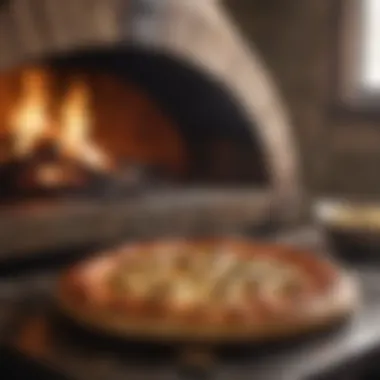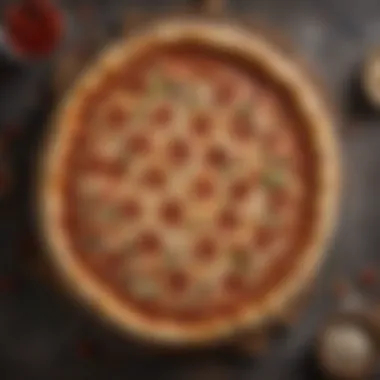Crafting the Perfect Sourdough Pizza Crust: A Masterclass in Artisanal Flavor


Crafted Sensationally Delicious Sourdough Pizza
- Beginning with an exceptional culinary endeavor, the quest of crafting a mouthwatering sourdough pizza crust is an art form intrinsic to perfecting the realm of pizza-making. Its essence lies in achieving the ultimate fusion of chewiness and crispiness, signifying a paramount gastronomic achievement. Tonight, let's decode the mysteries of creating a spectacular sourdough pizza crust that will undoubtedly revolutionize your pizza experience.
Ingredients Unveiled
- To embark on this gastronomic journey, gather around flour of high-quality and heritage, ensuring a superiority of taste and integrity to the dough. Revel in the embrace of live starter culture, a testament to time-honored fermentation techniques. Oil infused with finesse, sea salt extracted from nature's bounty, each element meticulously selected to weave a symphony of flavors within a single crust.
- The chronicles of preparation begin with a meticulous compilation of a detailed itinerary enlisting each ingredient's role. Sail through the sea of instructions, carefully charting each step in crafting the dough and sauce, ensuring a harmonious marriage between tradition and innovation. Navigate through the treacherous waters of ingredient handling with finesse, acquainting yourself with the fundamental principles governing the art of pizza-making.
Artistry in Assembly and Baking
- As the canvas of creation unfolds, sprinkle the dough with an array of vibrant toppings, a kaleidoscope of flavors waiting to burst forth in a glorious symphony. Master the nuances of achieving the perfect bake, strategically manipulating oven temperatures akin to a maestro conducting a grand orchestra. Explore the vast expanse of variations and customization, allowing your creativity to transcend boundaries in the pursuit of culinary excellence.
- Amidst the realm of pizza demigods, emerge victorious by deciphering the enigmatic realm of serving suggestions. Roam through verdant garnishes, ascend to the crescendo of additional toppings, saunter within the melodies of bespoke sauces hailing from distant lands. Embrace the divine art of pairing, harmonizing beverages and side dishes, orchestrating a culinary concerto that resonates with every discerning palate.
Prodigy in Cook's Notes and Tips
- Embark upon a journey teeming with the zeitgeist of culinary enlightenment, unraveling additional tips to elevate the pizza experience to unparalleled heights. Navigate through the troubleshooters' labyrinth, vanquishing common issues plaguing novice and seasoned chefs alike. Behold the chalice of gastronomic wisdom, brimming with elixirs of flavor enhancement and texture refinement, a testament to the endless pursuit of mastery in the realm of sourdough pizza craftsmanship.
Introduction
Understanding Sourdough
What is Sourdough?
Sourdough is a naturally leavened dough made from a mixture of flour and water that undergoes fermentation due to wild yeasts and lactobacilli. This fermentation process gives sourdough its signature tangy flavor and unique texture, setting it apart from commercially produced bread. The presence of wild yeasts in sourdough contributes to its natural rise, resulting in a lighter, more digestible final product compared to traditional yeast-based doughs.
Importance in Pizza Making
Sourdough's role in pizza making is pivotal, as it introduces depth of flavor and a nuanced complexity to the crust. The long fermentation period of sourdough not only enhances the taste but also improves digestibility and nutritional value. By incorporating sourdough into pizza crusts, chefs can elevate the overall dining experience, appealing to discerning palates seeking authentic and artisanal offerings.
Why Choose Sourdough for Pizza?


Flavor Profile
The flavor profile of sourdough is distinctive, characterized by subtle tanginess and rich umami notes that complement a variety of toppings. This complexity adds a sophisticated layer to pizza, enticing food enthusiasts looking for unique taste experiences. Sourdough's flavor evolves during the fermentation process, resulting in a depth that enhances the overall dining pleasure.
Texture Benefits
The texture of sourdough pizza crust is a harmonious balance of chewiness and airiness, owing to the natural leavening process. This tactile sensation, coupled with the crust's crisp exterior, creates a satisfying bite that resonates with pizza aficionados. The irregular air pockets formed during fermentation contribute to a light yet substantial crust that holds up well to a range of toppings.
Tools and Ingredients
Essential Equipment
To embark on the sourdough pizza-making journey, essential equipment includes a quality mixing bowl, digital kitchen scale, and a reliable oven with precise temperature control. These tools ensure accuracy and consistency throughout the dough preparation and baking process, yielding a professional-grade outcome.
Key Ingredients
Key ingredients for sourdough pizza crust encompass high-quality bread flour, filtered water, sea salt, and an active sourdough starter. The flour's protein content influences the crust's structure, while water hydrates the dough for optimal gluten development. Sea salt enhances flavor, and a vibrant sourdough starter serves as the heart of the crust, imbuing it with character and depth of taste.
Creating the Sourdough Starter
Activation Process
Feeding Schedule
Within the activation process lies the crux of nurturing your sourdough starter to vibrant life. The feeding schedule dictates the frequency and proportions of feeding your starter, ensuring a robust and active culture. This element plays a crucial role in maintaining the starter's health and promoting the development of desirable microbial communities, essential for flavor development. The consistency and accuracy of your feeding schedule directly influence the fermentation process, ultimately impacting the flavor profile and texture of your final crust. While it requires commitment and precision, a well-regulated feeding schedule reaps rewards in the form of a lively and flavorful starter for your sourdough pizza.
Maintaining Starter Health
The maintenance of starter health is a foundational aspect of sourdough craft that cannot be overlooked. This subsection explores the principles of nurturing and safeguarding the vitality of your starter over time. Ensuring a clean and favorable environment, proper aeration, and consistent feeding routine are vital for the sustained vigor of your starter culture. By understanding the signs of a healthy starter and implementing measures to prevent contamination or imbalance, you pave the way for consistently excellent dough prepared with a robust and reliable starter.


Starter Consistency
Hydration Levels
The hydration levels of your sourdough starter significantly influence its behavior and the resulting dough texture. Balancing hydration is a subtle art that impacts both fermentation speed and gluten development, culminating in the desired chewiness of the crust. By adjusting hydration levels, you can tailor your starter to suit different recipe requirements and ambient conditions, ensuring optimal performance. From pancake batter-like consistencies to thicker, stiffer mixtures, experimenting with hydration opens up a realm of possibilities for enhancing your sourdough pizza baking adventures.
Visual Cues
Visual cues are invaluable indicators of your starter's readiness and health, offering insights that complement quantitative measurements. Monitoring activity levels, observing rise and fall patterns, and noting consistency changes allow you to assess fermentation progress and adjust feeding schedules accordingly. These visual cues serve as windows into the microbial activity within your starter, guiding your decision-making process and facilitating intuitive adjustments. By honing your observation skills and learning to interpret these visual cues, you empower yourself to cultivate a flourishing starter that forms the foundation of exceptional sourdough pizzas.
Preparing the Dough
Mixing and Fermentation
Kneading Techniques
Kneading techniques are the cornerstone of developing gluten structure in the dough, contributing to its elasticity and texture. The key characteristic of expert kneading lies in the consistent application of pressure and folding motions, ensuring proper gluten formation. This technique is a popular choice for our article due to its ability to create a resilient and air-filled crust, enhancing the overall eating experience. However, over-kneading can lead to a tough texture, underscoring the importance of mastering the balance in kneading.
Fermentation Time
Fermentation time is a critical element that imparts depth of flavor to the dough while allowing it to rise naturally. The extended fermentation process aids in breaking down complex sugars, resulting in a more complex and nuanced taste profile. This technique is favored for its ability to develop a well-fermented dough that enhances the crust's digestibility and flavor. However, excessive fermentation can lead to a sour taste, necessitating a keen eye on the duration to achieve optimal results.
Shaping and Proofing
Forming the Crust
Forming the crust involves meticulously shaping the dough into the desired size and thickness, determining the pizza's foundation. The key characteristic of proper shaping lies in creating an even surface with a slightly raised edge, ideal for trapping sauce and toppings. This method is a popular choice for our article as it ensures uniform baking and a visually appealing end result. However, uneven shaping can cause uneven cooking, emphasizing the importance of precision in this step.
Proofing Tips


Proofing tips are essential to allow the dough to rise adequately before baking, ensuring a light and airy texture. The key characteristic of effective proofing tips is providing optimal warmth and humidity to support yeast activity and dough expansion. This technique is favored for its ability to develop a flavorful and well-aerated crust that complements the toppings. However, over-proofing can lead to a collapsed structure, highlighting the need for attentiveness during this stage.
Baking the Perfect Sourdough Pizza
Baking the Perfect Sourdough Pizza is a pivotal aspect in the journey towards achieving the ultimate sourdough pizza crust. The culmination of all previous steps, from creating the sourdough starter to preparing the dough, leads to this crucial stage where the magic truly happens. The baking process not only cooks the pizza but also transforms it, imparting the desired texture and flavor that define a great sourdough pizza. It is the final moment of truth where all your efforts converge to deliver a masterpiece of culinary delight.
Oven Setup
Temperature and Preheating
Temperature and Preheating play an indispensable role in the success of baking the perfect sourdough pizza. The oven temperature must be carefully calibrated to ensure an ideal cooking environment for the pizza. Preheating the oven is essential as it allows for even heat distribution, preventing undercooked or burnt spots on the crust. The precise temperature sets the foundation for achieving the desired crispy yet chewy texture that characterizes a top-notch sourdough pizza.
Baking Surface
The choice of Baking Surface significantly impacts the outcome of the sourdough pizza. Whether you opt for a baking stone, steel, or perforated pan, each surface offers unique benefits that influence the texture and appearance of the crust. A quality baking surface promotes proper bottom browning and crust development, crucial for a well-balanced pizza. Understanding the characteristics of different surfaces empowers you to select the most suitable option for crafting your perfect sourdough pizza.
Assembly and Toppings
Sauce and Cheese
Sauce and Cheese selection can make or break the flavor profile of your sourdough pizza. The choice of sauce, whether traditional tomato-based or innovative alternatives, complements the tanginess of the sourdough crust. Likewise, the cheese selection influences the overall richness and creaminess of the pizza. Balancing the sauce-to-cheese ratio is key to achieving a harmonious blend of flavors that accentuate the quality of the crust.
Creative Topping Ideas
Exploring Creative Topping Ideas allows you to elevate your sourdough pizza beyond the ordinary. Experimenting with unique combinations of toppings, from gourmet meats to exotic vegetables, adds a creative flair to your culinary masterpiece. Embracing unconventional ingredients and contrasting flavors opens up a world of tantalizing possibilities, showcasing your culinary ingenuity and delighting your taste buds with every bite.
Tips for Optimal Results
Achieving Crispy Crust
Mastering the art of Achieving Crispy Crust is a hallmark of a well-crafted sourdough pizza. The key lies in balancing moisture levels and heat distribution to achieve a golden, crispy exterior while maintaining a tender interior. Implementing techniques such as par-baking, adjusting oven settings, and mastering dough hydration levels are essential for achieving that perfect crunch with every bite.
Flavor Enhancement
Enhancing the Flavor profile of your sourdough pizza takes it from good to exceptional. Incorporating aromatic herbs, premium cheeses, infused oils, or unique seasoning blends can elevate the taste experience to new heights. Striking a harmonious balance between savory, tangy, and umami notes ensures a flavor-rich pizza that resonates with your palate. Experimenting with flavor combinations opens endless opportunities for creativity and culinary exploration.







